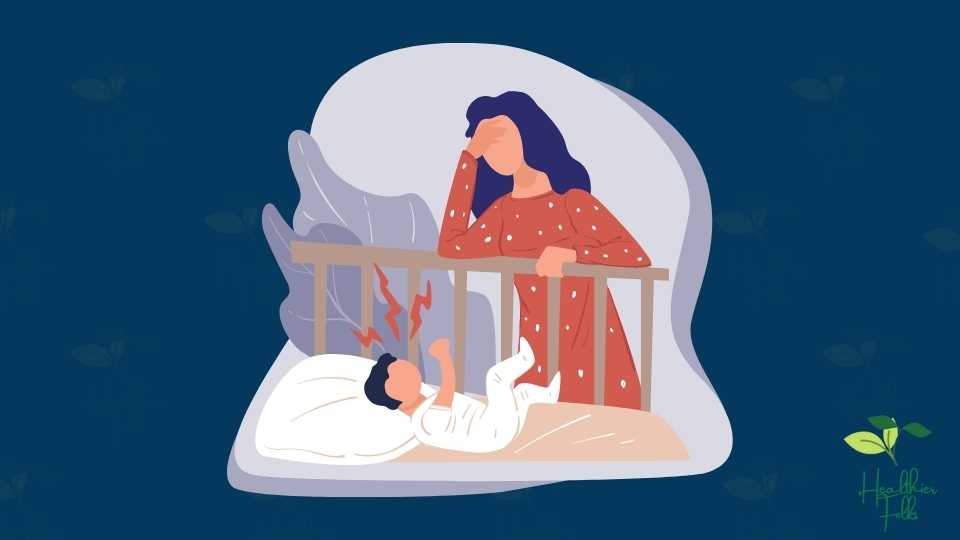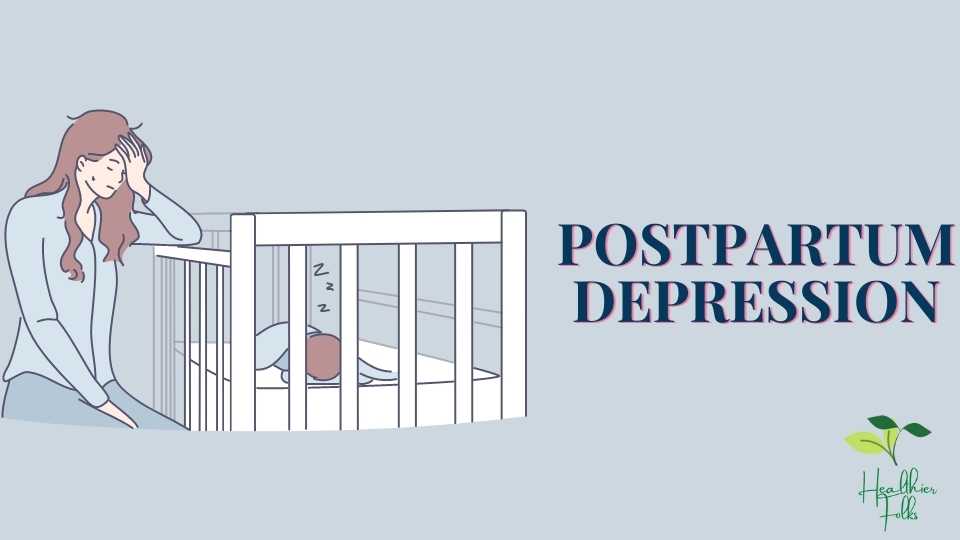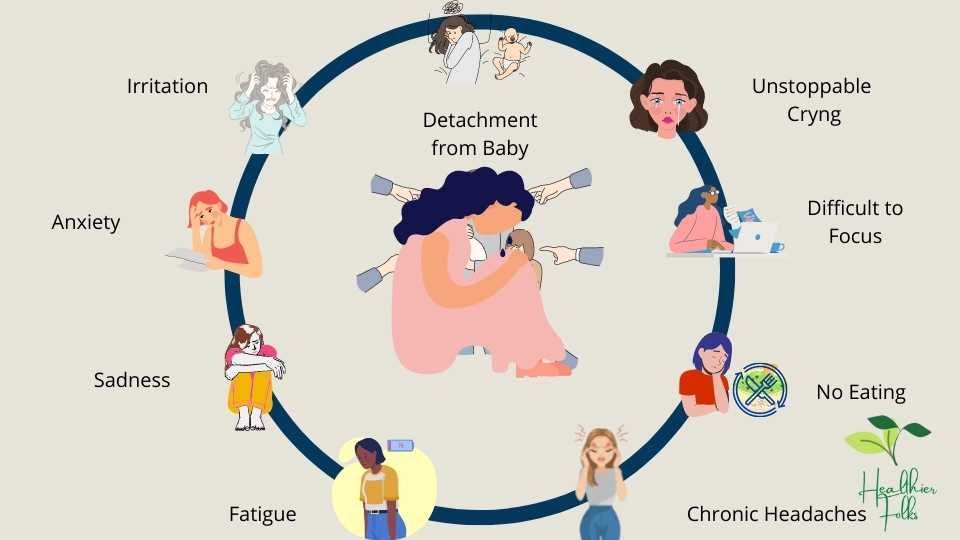
Postpartum Depression: Is it a Real Threat?

I would like to give you a brief overview of a person’s daily life before we get started with Postpartum Depression. When it comes to the best experiences of life for men and women, being parents, they will say is inevitably incredible. But in some cases, it comes with a sprinkle of depression also for both genders. Though we won’t be calling it a bad experience.
Postpartum Depression which is also referred to as PPD is the type of depression that is faced by people after the birth of a child.
An Intro to Postpartum Depression: Everything You Ever Wanted to Know About it
PPD is referred to as the perinatal mood disorder, as it is the outcome of the physical or hormonal changes in a woman. After giving birth most mothers, experience feeling of mixed emotions which includes joy, fear, anxiety, sleeplessness etcetera at the same time.
As well as being sleep deprived, they get stressed out. It is the time when a new mother is targeted with these emotions while tackling numerous challenges simultaneously. It generally happens immediately after delivering the baby or within 3-4 weeks of the child. Additionally in several cases, it starts more than after a month after a child’s birth.
Postpartum depression is nothing like a women’s weakness or disease not going to be treated well. However, it happens to only 15-20 percent of people and gets away along with the time. It is better to consult a doctor if it is lasting for long.
Therefore, if it lasts for more than 2 weeks, it will be the best option to seek PPD depression help from doctors or health professionals.
Nonetheless, it is a serious type of illness as it gives a new mother the baby blues or feeling of sadness all day. A woman may feel fatigued or hopeless, but it doesn’t convey the message that she doesn’t love her child.
How can Postpartum Depression be Caused?
It is normal when a person doesn’t get enough sleep and has someone else to look after, to get depressed. Because he/she may not be able to do self-care. And the feeling of tiredness regularly makes a person feel frustrated with others and himself/herself.
Similar is the case with the mother who just gave birth. She has no time for herself, as she has to take care of her child. Initially, there is no specific time for a child’s sleep due to which the mother suffers from sleeplessness. Moreover, there is no explanation needed that how mandatory is getting enough sleep for the proper functioning of the body and brain.
Various new studies have found that about 10-15 percent of new fathers have also experienced this mental ailment. The higher rate of its occurrence has been seen approximately after 5-6 months of a child’s birth.
Postpartum Depression Symptoms: What do They Look Like?

The symptom of this mental illness varies from person to person. A person dealing with this type of mental illness may feel:
1. Irritated
Irritation is basically caused when you are not able to do what you want, or you have a lot to do, and you are unable to manage time. It can happen when you are feeling so fatigued by the never-ending tasks of the daily routine.
The same is the case after the child’s birth. A person needs to devote time to the baby too and some people get a feeling of complication in taking care of their baby. Eventually, they start feeling irritated.
A person requires time to get stopped by and look for himself/herself, which sometimes is next to impossible.
2. Anxious
Every parent tries their hard to follow the accurate process of nurturing their child. Moreover, they skip time for their self-care and try to do their best for their infants.
Some start feeling stuck like they are not capable of doing anything after the child’s birth. They get this feeling of worthlessness in their life and think they are helpless.
These states push them towards anxiety, and they end up being anxious all the time. Their brain starts over-thinking, and it has adverse effects on their brain.
3. Sadness all the Time
Sadness is a common factor among all new parents, especially women. The main reason behind this is if no one else is assisting her with the baby, she feels stuck all alone. This is a sign that she is dealing with postpartum depression, and it should not be ignored.
Everybody needs a break at least for a while so that they can relax their mind for a moment. When not able to relax they feel sad from inside.
4. Fatigue
No time for oneself during the day while responsibly taking care of a newly born and still no sleep at night turns one’s world upside down.
Rest and proper food are required for our mental and physical health in order to work well.
5. Chronic Headaches Due to Stress or Sleeplessness
A normal person cannot compromise a single day’s sleep because his body and brain won’t be able to function properly.
But a mother tries every possible way she can do the best care of her child. She sometimes forgets herself and it leads her to chronic headaches.
6. Not Eating
Not being able to sleep well will not allow you to eat. Yes, it affects our eating habits too. Some people experience the feeling of nausea too due to lack of rest or sleep and it doesn’t allow them to eat.
7. Difficult to do Brain Work
It becomes difficult to focus on the work as the brain cannot work without proper mental care. Proper brain food is required which includes healthy meals and enough night-time sleep.
8. Unstoppable Crying
One cannot resist crying of course when it is about her health. Women when not able to cope with the stress of having a burden of responsibility for their newborn, they can’t resist but cry. Crying does help to release stress to some extent, studies show.
9. Detached from Baby
Some women feel so detached from the baby because they feel tired of coping with the same routine for days. They feel like they were having a better life before they had a child.
This is actually not the case, as a child grows up there are higher chances that these feelings fade away and your happy days will start again. You may feel pleasure afterward and affection towards your child will increase much faster.
How do you know you’re at risk for postpartum depression?
If someone in your family history have had been dealing with depression, you may face maternal depression in your previous pregnancy. Then, there will be chances that a person may experience postpartum blues.
In addition to this, if one is already struggling with bipolar disorder which is also called as manic depression. Then due to this depressive disorder, he/she faces mood swings at an extreme rate.
Apart from this, various studies have shown that post-delivery depression can cause in case of a mother:
- If she had been through a tough time due to negative and stressful life events.
- If her career growth is hindered due to the child’s birth.
- If she has suffered the loss of someone close’s death.
- If she is suffering from personal relationship problems or physical and mental abuse.
- It may happen with single moms struggling in their life alongside taking care of a newly born.
- If a baby is born with some sort of health issue and is in dire need of proper care.
Postpartum Depression Comes in a Variety of Forms. What are They?
Depression after birth has many ways to be described, so it is termed in the following ways:
1. Baby Blues
You are a new parent and all of a sudden there is a change in your normal routine. So it is normal to have been hit by a little postpartum blues or baby blues.
It is very often in about 7 out of 10 women across the world. Women may get mood swings like getting very happy for a moment or getting sad and crying, getting anxious, not being able to sleep, and feeling restlessness throughout the day or for numerous days initially.
They get a feeling that they are alone in this and got stuck in some kind of problem which is not getting away. But the good thing is that it does not lasts long. Mainly it gets away in a month only.
Women having baby blues generally do not require treatment from any healthcare professionals or doctors.
2. Postpartum Depression
Symptoms of PPD are much more similar to baby blues only. Just like post-pregnancy can make women feel anxious, sad, sleepless, and irritated. But the only difference here is that these feelings have a stronger grip on them.
In most cases, postpartum depression can take a long way to get recovered from. However, it is advisable for such cases to consult your healthcare specialist and get suitable advice.
Otherwise, there are chances that these can affect the women with a newly born one adversely. Counseling in a few cases is advised and works well. This state of depressive disorder must not be neglected.
3. Postpartum Psychosis
It is a lethal stage of depression which is believed to be very serious that a person (woman) has no control over her thoughts. Certainly, it is not a very common postpartum problem, only one in a hundred women is targeted by depression.
But someone is facing this depression, she needs to get help from healthcare professionals the moment they discover this problem. That is the reason, it is recommended for all people who are under any kind of depression, they must at least share it with someone.
If not treated at the time a woman may end up hurting herself or someone else or maybe her child. The reason behind this is some women lose their sense of reality. They may experience hallucinations like seeing or hearing things that are not real, delusions like having extreme beliefs in thought that are absurd and unreasonable.
Why does Postpartum Depression Affect Men and Women Differently?
Depression is common these days in people of different ages, and it depends on several events. Postnatal depression symptoms in men are not very common. But there are few fathers who go through this depression after the birth of a child.
Even new fathers have a chance to experience serious mood disorders when a child enters into their life. Studies have shown that 10% of men experience this situation.
The risk factors responsible for the rise of parental depression in men are:
1. Loss of Partner’s Attention
Men are affected by postnatal depression because after the birth of the child they lose the touch of a healthy relationship with their partner. They don’t get enough attention from their wives since mothers spend most of their time taking care of a newly born baby.
This is the reason they start feeling left out and feel that their bond is getting weak.
What efforts must be made by both partners to tackle to depression during pregnancy?
This situation can be dealt with ease to some extent men and women equally work time to time for their child management. They should go for a walk at least once per day or go to the restaurant once every week, if possible.
The couple can take the child in a stroller if no one else in the family is available to support them.
Except this, partners must:
- Try to get involved in conversations with your partner when the baby goes to sleep.
- Talk about the times you used to spend together with love and affection for each other. This will ignite the spark in your relationship.
2. Desired Happiness not Achieved
Post the delivery of a child, when the mother gets involved in taking care of her child all the time and is not able to devote her time to her husband. And along with the mother, his schedule gets disrupted resulting in improper sleeping hours, and fatigue at work and throughout the day.
Sometimes the father gets the feeling of detachment from the baby. He starts thinking that he is not happy after the child’s birth which makes him feel guilty about himself.
3. Pressure of Managing Finances
The arrival of a new member of the family is accompanied by new responsibilities. So it is natural for couples to experience financial stress.
Postpartum Depression Is Failing Us? Can we Prevent it from Happening?
Depression after a child’s birth is a normal situation until it sticks its roots into your life. Otherwise, it can affect the way you are living your life and can close all the doors to your happiness.
But still, humans can deal with these situations in many ways and these ways vary from person to person. Following are some techniques that can be opted by a person prior to this form of depression hitting him/her.
1. Proper Guidance of PPD
Prior to the child’s birth, parents should learn about the postpartum depression symptoms. They should know what conditions can trigger them so that they can try to prevent it from happening.
2. Exercise, Yoga, or Meditation
Exercising or doing yoga, or meditating on a regular basis can assist them against any kind of depression in a natural way.
3. Bond with Counterpart
One should know that he/she is not alone in this and in order to make them feel surrounded never quit making healthy relations with them. Keep them reminded how lucky you feel to have them in your life.
4. Fewer Expectations
Always expect less because after welcoming a new child into the family you may not be able to stick to your routine. So prepare your brain accordingly. Moreover, during this period never introduce a new habit or task into your daily routine.
5. Stress Control
It will be a time when your patience level will be tested. Therefore, controlling your anger, your thoughts and stress will protect you from getting depressed.
6. Distance from Pessimistic People
Try to maintain a distance from the people giving you grays (negative vibes.) Hold onto the people with healthy brains and positive energy as they convert the energy around you into negative energy.
7. Healthy Eating
Eating habits should be in mind as healthy nutrients add unexpected benefits to your body. Foods like fresh leafy greens, citrus fruits, dark chocolates, coffee, berries nuts, seeds etcetera.
8. Spend Less Time on Social Media
Despite spending time on social media apps try to indulge in conversation with your partner, try helping her manage the baby, and include in the activities in which you both can get involved. These will foster understanding between both of you.
9. Say no to Alcohol or Substance Use
Alcohol or any substance intake during post-child’s birth time is not good for women and nor for men. These substances will have adverse effects on the child’s health if consumed by women and can trigger the rate of depression in both genders.
10. Sleep Well
Managing time to sleep will prevent you from getting tired and will refresh your mind and body. In this way you can remain stress-free of course and your brain works well and your body will get enough energy to manage all day’s tasks.
Treatment of this Rising Postpartum Depression
Based on the symptoms once the diagnosis of postpartum depression is done. One should seek help from doctors or healthcare professionals. Some people get positive results by:
- Proper counseling via healthcare professionals for depression during pregnancy
- Working on improving their self-care routines.
- Appropriate intake of prescribed medicines by doctors or psychiatrists.
- Indulging in groups on social media or in person along with the people tackling postnatal depression.
A Healthy Idea from Healthierfolks.com
People in postpartum depression really need to be taken care of. If you see people around you are facing any type of depression, it is advisable to help them. Assist them as much as you can, you may save someone’s life with your little help. Never leave a person in need, you can even convey this message to mental healthcare agencies on the patient’s behalf.



